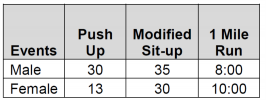As with most 19 year old males, his father, who only did 20 years active duty in the Air Force, and has only been working for the Marines as a contractor for nearly another 20, is the most ignorant person on earth and can't possibly know anything about anything.Background - my son did 3.5 years JROTC in high school. Did a year (sort of) of community college, with no ROTC program. Transferred to a 4 year college (as a transferring Freshman) which has an ROTC program.
He walked on to the ROTC program 1st day. They handed him an application (and no, he does not have a DODMERB physical, or dental records, etc.). He's a bit over max BMI, so they are not issuing him uniforms until he gets down to acceptable levels. He has been PTing with the group, and hopefully, the weight will fall off quickly.
As with most 19 year old males, his father, who only did 20 years active duty in the Air Force, and has only been working for the Marines as a contractor for nearly another 20, is the most ignorant person on earth and can't possibly know anything about anything.
First question: What is his status as an ROTC cadet? As I see it, he's merely an applicant to the program at this point.
A week or two into his association with the ROTC program at his college, he was contacting by an Army National Guard recruiter about the SMP program, and seems to be blinded by the promise of tuition assistance, monthly stipend, and drill pay as an E-5. SMP program requires (as I read it):
- at least 30 college credits completed with 2.0 GPA or higher (he should be there by the end of Spring 2022 semester).
- approved major.
- 180 minimum on AFPT (60 min in each area).
- BMI/weight below maximums
- A status as a CONTRACTED, NON-SCHOLARSHIP CADET. Yes, that was boldface and all caps, as this is the first area where we disagree. Like I said before, as near as I can tell, he's merely an applicant, taking ROTC class and PTing at this point in time.
- completion of BCT and optionally, AIT in the U.S. Army
Second question: At what point does he become a contracted, non-scholarship cadet? Please, authoritative answers you can back up with documentation only.
This Army National Guard recruiter is asking my son to start filling out enlistment paperwork, with a goal of him attending BCT this summer (and possibly a very short AIT course such as being a truck driver). Son is reticent to share the paperwork the recruiter is sending him (probably to show me what a big bad adult he is).
Hopefully, someone here is active with the ROTC program, and can give me some authoritative answers before my little Wile E. Coyote, Super Genius, winds up an enlisted grunt toting an M-4 around BFE (not that there's anything wrong with that if a person knowingly and willingly wants to go that route).
Thanks,
Man to think I was the only Dad of a 18 year old, who thought I was the most ignorant person on earth.
MS1 and MS2 are just cadets, taking ROTC as a PE requirement or class. Unless they win a campus based 3.5 or 3 year scholarship they won't contract till their 3rd year/ MSIII year.
Unless tuition money is an issue, joining the guard to become an SMP isn't necessary or earns points on the OML. SMP obligations can be a hassle to a college student who may need the weekend drill time to study or get projects completed.

